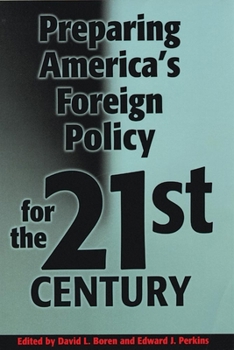Preparing America's Foreign Policy for the 21st
Select Format
Select Condition 
Book Overview
In 1997 and 1999 a very select group of analysts, practitioners, and scholars assembled at the University of Oklahoma to lay the groundwork for a new United States foreign policy that will promote our nation's ideals while protecting its vital interests in the post-cold war era. This carefully edited collection includes major policy statements and round-table discussions by the best minds of our time as they devise criteria for the employment of military force, economic and trade priorities, a broad covert intelligence mission, and the protection of our planet's ecology-all in the context of our pluralistic society and instantaneous global communication.
Format:Hardcover
Language:English
ISBN:0806131233
ISBN13:9780806131238
Release Date:May 1999
Publisher:University of Oklahoma Press
Length:448 Pages
Weight:1.72 lbs.
Dimensions:1.3" x 6.4" x 9.4"
Customer Reviews
1 rating
Starting Point for 21st Century Security Strategy Dialog
Published by Thriftbooks.com User , 25 years ago
I know of no finer collection of relevant views on our current and prospective foreign policy challenges. In the foreword to the book, William Crowe, former Chairman of the Joint Chiefs of Staff and then Ambassador to the Court of Saint James, observes that "A reappreciation of government is also in order." He clearly articulates both the range of challenges facing us (most of them non-military in nature), and the disconnect between how we organize our government and how we need to successfully engage. His bottom line is clear: we are not spending enough on the varied elements of national security, with special emphasis on a severely under-funded and under-manned diplomatic service. From Gaddis Smith and Walter Mondale to Sam Nunn and Robert Oakley, from David Gergen to David Abshire to David Boren, from Kissinger to Brzezinski to Kirkpatrick, in combination with a whole host of lesser known but equally talented practitioners, capped off by comments from five Directors of Central Intelligence, this books sets a standard for organized high quality reflection on the future of U.S. foreign policy. Most interestingly, there is general consensus with David Abshire's view that we are in a strategic interregnum, and still lacking for a policy paradigm within which to orchestrate our varied efforts to define and further our vital interests. David Gergen clearly articulates the shortfalls in our national educational, media, and political patterns that leave the vast majority of Americans ignorant of our foreign interests and unsupportive of the need for proactive engagement abroad. Reading this book, I could not help but feel that our national educational system is in crisis, and we need both a wake-up call and a consequent national investment program such as occurred after the first Sputnik launch. David Boren is clearly a decade or more ahead of most current commentators in his call for a new paradigm, for a new analytical framework, for the internationalization of American education across the board. I am reminded of the quotation from early America: "A Nation's best defense is an educated citizenry." Interestingly, he cites Daniel Boorstein's caution that we must not confuse information with knowledge, and in the next sentence notes: "I watched during my term as chairman of the Senate Intelligence Committee while the CIA greatly increased its information, its raw data, but became overwhelmed and unable to separate the important from the unimportant." I would itemize just a few of the many, many useful insights that this book offers: 1) Diplomacy is the sum total of familiarity with the role, knowledge of the component parts of the overall national security policy, and the ability to design and implement comprehensive policies that achieve the national objectives; 2) Politicians and policy-makers are losing the ability to think objectively and act with conviction...they are too dependent on short-term domestic polling and opinion; 3) (Quoting Donald Ke





